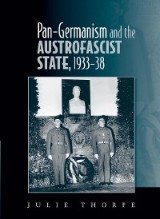Details

Pan-Germanism and the Austrofascist State, 1933-38
|
129,99 € |
|
| Verlag: | Manchester University Press |
| Format: | EPUB |
| Veröffentl.: | 19.07.2013 |
| ISBN/EAN: | 9781847797452 |
| Sprache: | englisch |
| Anzahl Seiten: | 272 |
DRM-geschütztes eBook, Sie benötigen z.B. Adobe Digital Editions und eine Adobe ID zum Lesen.
Beschreibungen
This book is about the ideas and policies that characterised the rightward trajectory of Austrofascism in the 1930s. It is the first major Anglophone study of Austrofascism in over two decades and provides a fresh perspective on the debate over whether Austria was an authoritarian or fascist state. The book is designed to introduce specialists, general scholars of fascism, and undergraduate students of interwar Austrian and Central European history, to the range of issues confronting Austrian policy and opinion makers in the years prior to the Anschluss with Nazi Germany.
The book makes an original contribution to studies of interwar Austria by introducing several new case studies, including press and propaganda, minority politics, regionalism, immigration and refugees, as the issues that shaped Austria’s political culture in the 1930s.
Its arguments and findings will be of value for scholars as well as students of interwar fascism and twentieth-century Austrian and Central European history.
The book makes an original contribution to studies of interwar Austria by introducing several new case studies, including press and propaganda, minority politics, regionalism, immigration and refugees, as the issues that shaped Austria’s political culture in the 1930s.
Its arguments and findings will be of value for scholars as well as students of interwar fascism and twentieth-century Austrian and Central European history.
This book is the first major Anglophone study of Austrofascism in over two decades. Introducing new themes, including press politics, minority politics, regionalism, immigration and refugees, it argues for a transnational approach to fascism in Austria.
Acknowledgements
Introduction
1. Pan-Germanism from Empire to Republic
2. Creating a Fascist press at home and abroad
3. Pan-Germanism and Austrofascism in a small town
4. Reich Germans, Auslandsdeutsche and minorities
5. ‘Ostjude’ as anti-Semitic stereotype
6. Citizens, immigrants and refugees
Conclusion
Bibliography
Index
Introduction
1. Pan-Germanism from Empire to Republic
2. Creating a Fascist press at home and abroad
3. Pan-Germanism and Austrofascism in a small town
4. Reich Germans, Auslandsdeutsche and minorities
5. ‘Ostjude’ as anti-Semitic stereotype
6. Citizens, immigrants and refugees
Conclusion
Bibliography
Index
Julie Thorpe is Research Lecturer in Humanities at the University of Western Sydney
This book is about the ideas and policies that characterised the rightward trajectory of Austrofascism in the 1930s. It is the first major Anglophone study of Austrofascism in over two decades and provides a fresh perspective on the debate over whether Austria was an authoritarian or fascist state. The book is designed to introduce specialists, general scholars of fascism, and undergraduate students of interwar Austrian and Central European history, to the range of issues confronting Austrian policy and opinion makers in the years prior to the Anschluss with Nazi Germany.
The book makes an original contribution to studies of interwar Austria by introducing several new case studies, including press and propaganda, minority politics, regionalism, immigration and refugees, as the issues that shaped Austria’s political culture in the 1930s.
Its arguments and findings will be of value for scholars as well as students of interwar fascism and twentieth-century Austrian and Central European history.
The book makes an original contribution to studies of interwar Austria by introducing several new case studies, including press and propaganda, minority politics, regionalism, immigration and refugees, as the issues that shaped Austria’s political culture in the 1930s.
Its arguments and findings will be of value for scholars as well as students of interwar fascism and twentieth-century Austrian and Central European history.

















